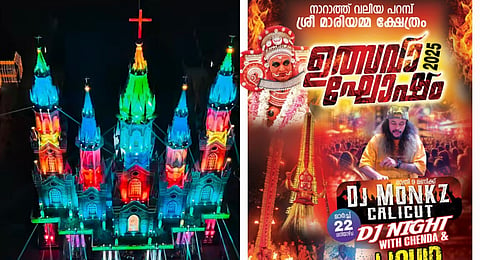

KOZHIKODE: Traditionally rooted in rituals, classical performances and percussion ensembles like chenda melam, temple festivals have recently embraced modern entertainment elements. The trend is equally evident in annual church festivals, with recent examples including the extravagant celebrations at the Immaculate Conception Church in Mananthavady and Infant Jesus Church at Kallettumkara in Thrissur.
DJ parties featuring electronic music and dazzling light shows have now become part and parcel of festivities, especially during the Utsavam season.
Just a week ago, the Uravinkal Devi temple festival in Naduvathur, Koyilandy, hosted one of the largest DJ events and light shows in the district, setting the stage for a growing trend. Several other temples, including Naduvathur temple, Arikulam temple, Muchukunnu Kottayil Shiva temple and Cherimangadu Kottayi temple, have followed suit, with many more set to incorporate similar spectacles in the upcoming festival season.
The evolution of these festivals highlights a fusion of tradition and modernity.
“This is a trend that has been picking up momentum for the last five to six years,” said DJ Prakash, a local artist who has been performing at temple festivals across Malabar.
“This festival season alone, I have been part of six shows in various parts of Kozhikode and Kannur districts. Earlier, we were invited to youth clubs and private events like weddings, but now temple committees have started hiring us. We bring a fusion of electronic beats and folk tunes to keep the audience engaged,” he says.
While the youths have welcomed the shift, the older generation has a more apprehensive approach. “When I was young, these festivals were all about devotion, processions and art forms like Kathakali and Theyyam. Now, you have people dancing to DJ beats in the temple compound. Suddenly, it feels like the soul of the festival is slipping away,” opines Naryanan Master, a retired school teacher.
Temple authorities themselves are walking a fine line. Some committees argue that modern additions are necessary to engage younger generations and enhance the festival’s commercial viability. “Times are changing,” said Krishnan Nambiar, a trustee at a prominent temple near Koyilandy. “We cannot ignore the preferences of the youngsters. The idea is to carefully blend tradition with modernity.”
However, the fusion has sparked intense debate within local communities. Traditionalists believe that the sanctity of temple premises is being compromised, while proponents of modernisation insist that festivals are evolving social gatherings that must reflect contemporary sensibilities.
“There is nothing wrong with adapting to new trends. For us, the DJ event is just another form of celebration. After the rituals end, a DJ night brings the whole community together in a different way,” said Divya R, a college student and festival volunteer.
This cultural shift is also portrayed in the recently released film Narayaneente Moonnaanmakkal, shot in Koyilandy. One of its actors said, “The film is not just about music or festivals. It’s about change. During our shoots, we saw both sides - people who loved the energy of DJ parties and elders who felt that something sacred was being overshadowed by all the glitz.”
Koyilandy, like many other towns in northern Kerala, has a rich tradition of temple festivals that involve rituals, chenda melam (traditional percussion ensembles), and community feasts. However, in recent years, these festivals have been incorporating modern entertainment options, including DJ nights, LED light shows, and even laser displays.
Yet, not everyone is convinced. Meenakshi Amma, a 72-year-old devotee, expressed her concerns. “We used to have devotional music nights and percussion that echoed spirituality. Now, when the DJ starts blasting film songs late into the night, it feels like a nightclub, not a temple festival,” she said.